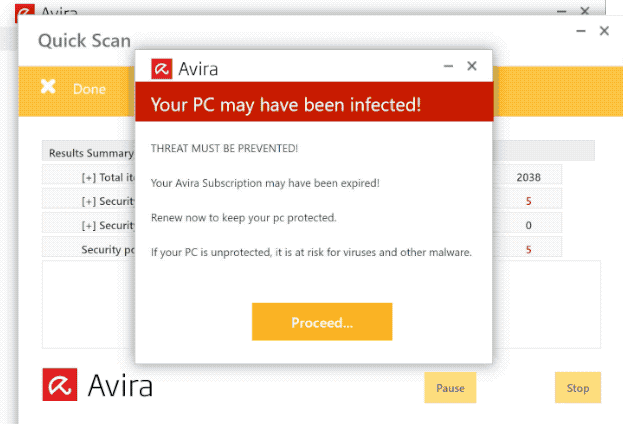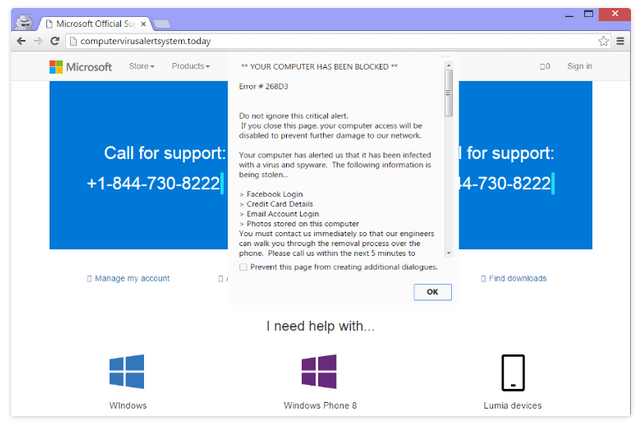“Avira – Your Pc May Have Been Infected” pop-up scam refers to a fake virus alert that appears on questionable websites and falsely informs users that their computers have been infected with several viruses. The contents of the pop-up are completely false, and you can ignore it.
“Avira – Your Pc May Have Been Infected” is a classic example of a fake virus alert. Users encounter them when browsing high-risk websites, which trigger redirects to other questionable sites. When redirected to one of these sites that host virus scams, users will be greeted with several pop-ups imitating virus scans.
This particular virus scam shows pop-ups that imitate Avira, a legitimate anti-virus program. One of the pop-ups will show a virus scan, with many threats supposedly found on the device. Another pop-up will explain that the computer has been infected but Avira’s subscription has expired. The user is asked to renew the subscription to supposedly remove the detected threats. It goes without saying that Avira is in no way associated with this scam, its name is merely misused by scammers.
Avira
Your PC may have been infected!THREAT MUST BE PREVENTED!
Your Avira Subscription may have been expired!
Renew now to keep your pc protected.
If your PC is unprotected, it is at risk for viruses and other malware.
Proceed…
While all fake virus alerts look more or less the same, they may have different objectives. Ones associated with specific anti-virus programs try to make revenue by misusing referral programs anti-virus programs have. For example, this particular “Avira – Your Pc May Have Been Infected” scam may be trying to misuse Avira’s referral system and get revenue from sales made through it.
Other fake alerts may try to trick users into downloading questionable or outright fake anti-virus programs. Or they may display fake tech support phone numbers so users would call for assistance.
Users who call are connected to professional scammers who pretend to work for Microsoft (or Apple depending on the scam). They scare users with threats that malware is stealing their files/information and offer to remove the malware. If users agree, the scammers request remote access to the device. Once connected remotely, the scammers put on a show of removing the malware. After they complete their script, the scammers demand a payment of a couple of hundred dollars. If users refuse to pay, the scammers often become aggressive and start threatening users.
Every single virus alert that appears in the browser will be fake. A browser is not capable of detecting malware. Users should only trust their installed anti-virus programs to provide them with accurate information about malware on their computers.
Why did you get redirected to a fake virus alert scam?
Users can be redirected to websites hosting fake virus alerts as a result of adware infections, or because they don’t have an adblocker program when visiting high-risk websites. Most redirects are caused by the latter. Due to the suspicious ads they host and the redirects they trigger, some websites can be classified as high-risk. For example, websites with pirated or pornographic content are considered to be high-risk since they expose visitors to a large number of questionable ads. Fortunately, a good adblocker program easily blocks these redirects.
Random redirects can also be a symptom of an adware infection. Adware and similar infections like browser hijackers can be installed via software bundling. This method essentially allows them to be installed alongside free software without explicit permission. The method is quite controversial, and anti-virus programs frequently classify programs that use it as potential threats.
Adware and other similar infections are often bundled with popular free programs as extra offers. Despite being optional, these offers are set to install alongside unless users explicitly deselect them. However, the offers are hidden in settings users don’t normally use, which means most users don’t even notice the offers. Deselecting these offers won’t be a problem if you install programs using the correct settings.
When given the option, choose Advanced (Custom) settings during program installation. All extra offers will be permitted to install alongside if you use Default settings as recommended by the installation window. Advanced settings will display every added offer. You will also have the option to uncheck all offers. We recommend deselecting all offers because otherwise, you will only fill your computer with junk programs that can be difficult to get rid of once installed. It’s much easier to uncheck a few boxes during installation than it is to remove persistent infections like adware.
“Avira – Your Pc May Have Been Infected” pop-up scam removal
If you get randomly redirected to this scam, you can simply close the tab. Installing an adblocker program is recommended to avoid these redirects in the future.
We also recommend scanning your computer with an anti-virus program to check for an adware infection. Adware is easily removed with an anti-virus program.
Site Disclaimer
2-remove-virus.com is not sponsored, owned, affiliated, or linked to malware developers or distributors that are referenced in this article. The article does not promote or endorse any type of malware. We aim at providing useful information that will help computer users to detect and eliminate the unwanted malicious programs from their computers. This can be done manually by following the instructions presented in the article or automatically by implementing the suggested anti-malware tools.
The article is only meant to be used for educational purposes. If you follow the instructions given in the article, you agree to be contracted by the disclaimer. We do not guarantee that the artcile will present you with a solution that removes the malign threats completely. Malware changes constantly, which is why, in some cases, it may be difficult to clean the computer fully by using only the manual removal instructions.

